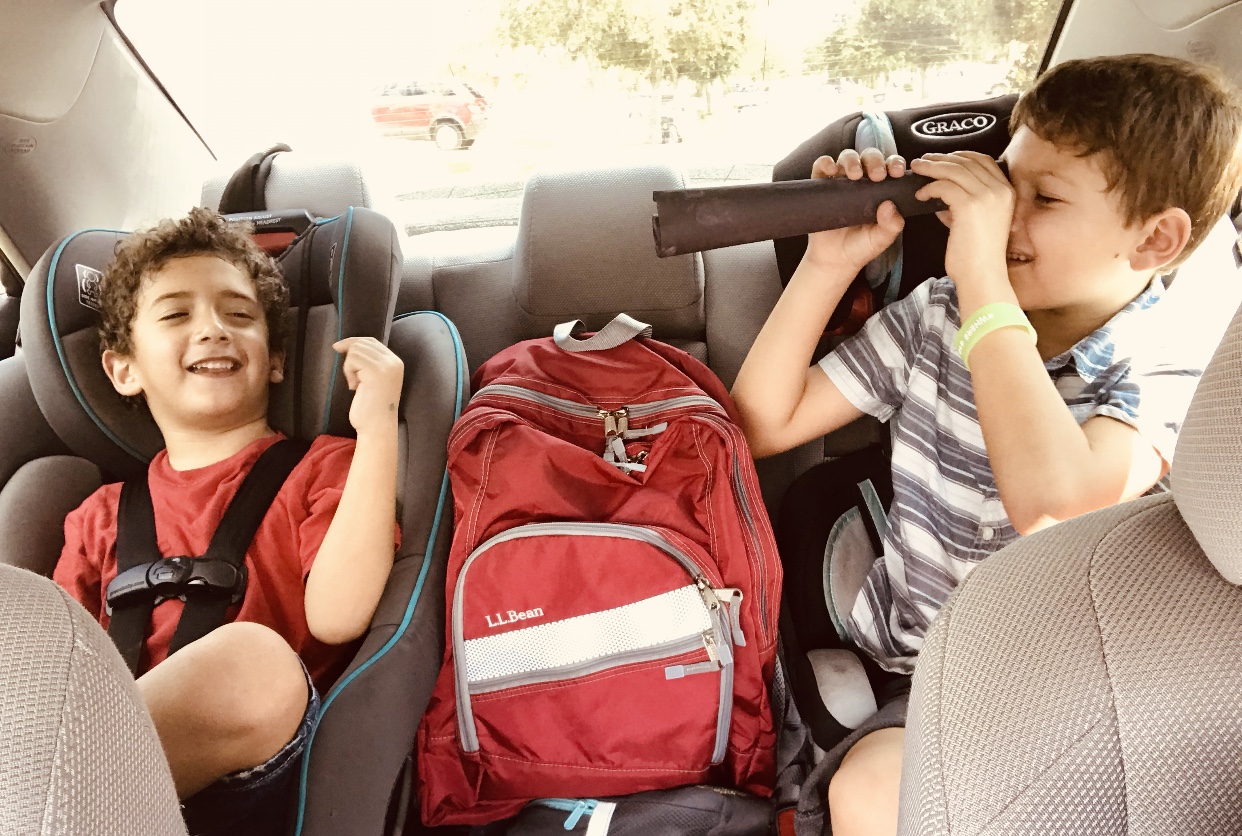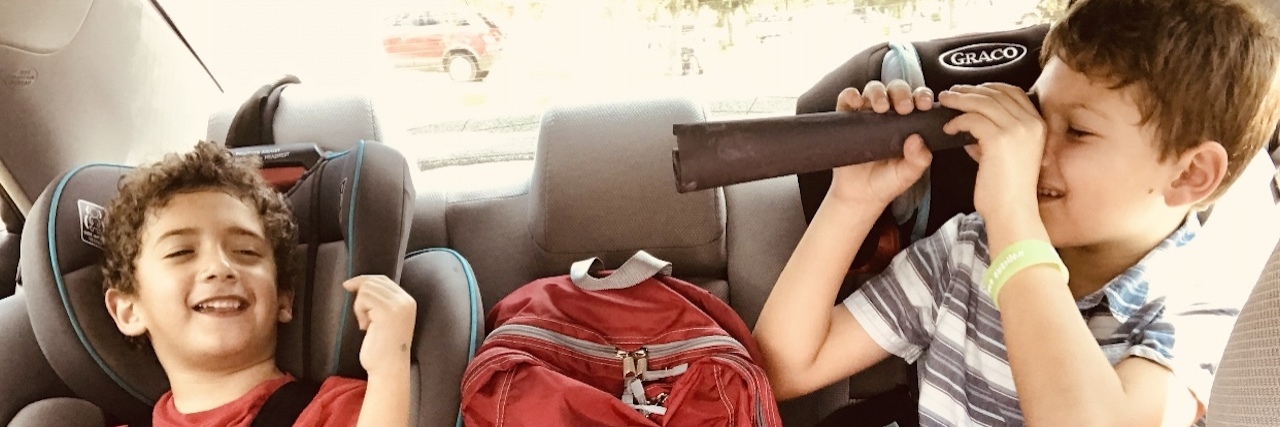“Mom, there’s a boy with autism at camp with me.”
Omar, my oldest son said this to me as we drove home from camp one day, over the summer. My youngest son, Lucas, is on the autism spectrum and is 4 years old. “Regular” summer camp was not a suitable option for him, due to his intensive therapy routine. It was also due to my inability to feel safe with that option. Lucas needs one-on-one supervision constantly, for his safety and also for the safety of others around him.
I know our therapy schedule is intense, but I am giving him the best chance, right? At least, that’s what I’ve researched, been told by professionals, and tell myself daily. I love my son for who he is. But when you get so lost in almost everything being therapy, you sometimes lose sight of other things. What is he missing out on instead?
It’s a fine line to walk.
But back to my older son’s statement.
“There’s a boy with autism at camp with me.”
My older son was not going to a camp specifically for kids with disabilities. His words lingered in my head and in a pit in my stomach. Up until that point, I suppose I had ruled out Lucas ever attending a “regular” camp with kids without diagnoses. I had assumed autism would make it too difficult, that he’d be too different. I thought he would have to be separate to be safe. That may sound extreme, but it’s my honesty.
I don’t want to take any chances with my son escaping or being somewhere the people responsible for him don’t understand him or know how to help him. So, I ruled out a “typical” camp for him. This was certainly the case for this summer. Had I even ruled it out for all years to come? But I couldn’t help but ask myself, was I putting limits on his potential?
This pushed me to face what I think my biggest worry has always been.
It’s not that my son won’t be capable of relationships and enjoyment with others. I worry others won’t be capable of having or possess the desire to have it with him.
Omar’s statement opened up the door to so many questions. I needed to know. How did things work out for that child at camp? Was it obvious that he struggled and was different from the other kids? Did he have triggers and meltdowns? Did other kids understand him? Did they try to? What did the teachers do if he had a meltdown? What did the other kids do? Did he participate in the camp activities? Did he ever run away? And, I suppose the most important in my heart was, did he have friends?
Throughout the summer, Omar continued to answer my questions. He told me all about how the boy at camp sometimes wanted things exactly his way. This could be as simple as him getting upset when someone casually grabbed “his” crayon, which he had carefully chosen. He sometimes yelled “No!” or hit another kid in close proximity when he was upset about someone doing something he didn’t want. He’d frequently bump into people trying to get to what he wanted or take it out of someone’s hand if they were already holding it. He’d also repeat things he liked over and over, like climbing the ladder in the playground or repeatedly script scenes from Disney movies.
There were times where the boy at camp didn’t acknowledge social rules like waiting on line, and he’d simply run to the front of the line to get on the slide. Then, he’d stay there, not letting other kids on after him. He needed extra supervision, so he wouldn’t run off into parts of the camp that weren’t in use during that particular activity. Many of these actions are very familiar to me, with Lucas.
I proceeded to ask my son how he treated this boy at camp.
Omar told me he was not intimidated by the boy’s differences, by his behaviors, and by his outbursts, though they were sometimes frustrating. My son, after all, was quite accustomed to these sorts of needs at home with his brother. Omar described their interactions and gave me examples of how he showed empathy, treating the boy at camp with respect for his individual needs and personality. Omar also mentioned thinking the boy might be autistic, before the boy’s sister had even told him.
I asked how others treated this boy at camp. I listened desperately to his answers. Omar went on to tell me that many of the kids didn’t understand the boy. Some kids yelled at him, telling him to stop doing the things they didn’t feel were appropriate. “Wait at the back of the line,” they’d yell when he cut. Other kids let him go in front of the line. Some kids made fun of him. But a few, including my son, were kind to him.
They saw him as a peer, a person, a friend.
I saw a glimpse into Lucas’ future in this boy at camp. There is still a long way to go regarding acceptance, awareness, and inclusion of children and adults with different abilities in our society. We have come a long way, but there is still a ways to go. And, it is the job of adults to educate themselves, be the example, live these things out, and teach the next generation acceptance and love. You see, I worry often that people who Lucas hopes will like him would be mean, insensitive, make fun of, and exclude him.
One beautiful revelation in all this is I realized I am raising a son with the awareness I hope others will have. Omar is willing to include and love others with and without obvious differences, even when I am not present to prompt him in that. I am proud Omar was insightful and thoughtful. I am proud he realized when the child’s “odd” behavior was not really “rude” or “disobedient.” My son showed him grace, empathy, and compassion. He viewed the child as important.
As I heard all this, I was filled with hope. I was filled with the hope that there will be an “Omar” for my Lucas, whenever he does have the chance to venture out into a more inclusive atmosphere. May there always be an “Omar” in his classroom, an “Omar” at his camp, and wherever he may go, to love him the way he is, accept him, and guide him.

The boy at my son’s camp gifted me with hope. He gave me hope that autism is not necessarily going to limit my son in the ways I had foreseen. And his mom gave me hope that this journey is not as restricting as I had feared. Although I’ll always be concerned about both my boys’ futures,
I got a beautiful reminder in this experience.
Out there, outside of the circle of protection I keep Lucas in, the community is sprinkled with good people. The people who will stick up for each other, “get” each other, and help each other understand our differences.
Those are the people who give me faith that a world with inclusion can exist.
Photo via contributor.

